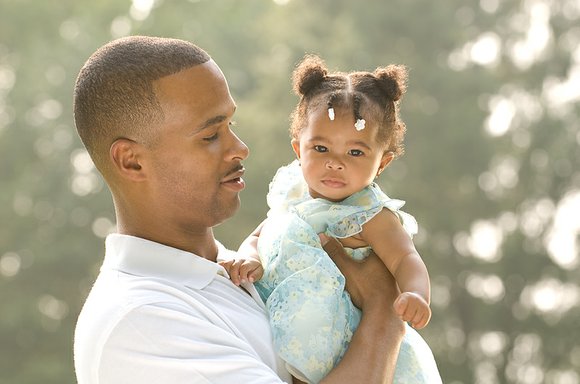First-time fathers experience many emotions: love, responsibility, protectiveness and even fear. Whatever the father’s relationship is with the baby’s mother, both parents’ lives are forever changed. But it’s important to remember that while much of the attention may be on new mothers, fathers can— and do— perform all aspects of
child care, except breastfeeding.
According to the National Responsible Fatherhood Clearinghouse (NRFC), fathers of infants face special challenges. These tips, when followed, can help reduce stress and build healthy routines.
Tip #1: Learn to survive without sleep. Babies do not have established sleep patterns that align with yours. Especially during the first few months, it is important to sleep when you can. If the baby is napping, try to take a nap, too. And, when possible, go to bed early so that when the baby wakes up during the night you will awaken having had some rest.
Tip #2: Manage stress. Your baby is 100 percent dependent on others for all of his or her needs. And many of your care giving responsibilities may be brand new. This can be stressful. Do your best to eat well, exercise, and accept help from others— grandparents, siblings, or close friends— who can give you and the baby’s mother a break. And, give yourself a break, too. Laundry and other household chores are less important than caring for the baby, the baby’s mother and yourself.
Tip #3: Share in the feeding. Even if the baby’s mother is breastfeeding, you can participate by bringing the baby to her or changing the baby’s diaper. If it is a late-night feeding, you can take the baby afterwards until he has gone to sleep. The more rested each member of the family is, the less stress there will be (see Tips 1 & 2 above). And, if you are both working outside the home, taking turns on late-night baby care will go a long way to ensuring you both have enough sleep to be productive.
Tip #4: Establish a routine. We are all creatures of habit. The sooner you establish a routine for the baby the sooner he or she will adopt regular sleeping habits, which will be good for the entire family.
Tip #5: Give Mom a break. Take the baby out of the house for an hour or so— for a walk, to the grocery store, wherever— to ensure that Mom has some down time. More importantly, this will provide you with one-on-one baby time.
Tip #6: Invest in your relationship. While each of you is getting used to your new role— “father” or “mother”—don’t forget that you are parents together. Continue to support each other as you incorporate a third person into your established relationship. And, dads, recognize that you likely will no longer be the #1 focus in the family; be understanding as everyone adjusts to their new roles.
Tip #7: Build trust. When an infant cries, your response (a clean diaper, a bottle, or simply holding her) will begin to establish trust. Providing a consistent, timely response shows the baby that you care for her and she can count on you.
Tip #8: Live with imperfection. No one is perfect. Neither are you. Being a parent is a new adventure. Learn from your experiences and talk to other dads to gain other perspectives. As long as you provide a safe, nurturing environment for your baby, you will learn how to become a better parent. A good resource for new parents, especially mothers, is text4baby. Simply text “BABY” (or “BEBE” for Spanish) to 511411 receive three free text messages a week, timed to the mother’s due date or the baby’s birth date, through pregnancy and up until the baby’s first birthday.
Tip #9: Keep good records. It’s important to ensure you have key information that you will need to refer to throughout the years. This includes your pediatrician’s contact information, as well as the baby’s immunization schedule, birth certificate, and Social Security Number. By gathering this information early and updating it regularly you will be prepared when it is needed most.
Tip #10: Enjoy today. It may be cliché to say that they grow up fast, but it’s true! Learn to enjoy this unique time in your baby’s life when the most basic things—riding in the stroller, watching a ceiling fan, or trying new foods— are both new and exciting. Looking at and experiencing things as your child does can give you a whole new appreciation for life.
“Learning from other fathers and sharing your own experiences results in children who have more engaged, positive relationships with their dads,” says NRFC Kenneth Braswell. “The larger the circle of caring adults the more likely children will know that they are loved.”
While you may be a new father, fatherhood is a lifelong commitment. The NRFC offers practical tools and resources to provide guidance at every stage of your child’s development. For more information, visit: www.fatherhood.gov or call 877-4DAD411.
